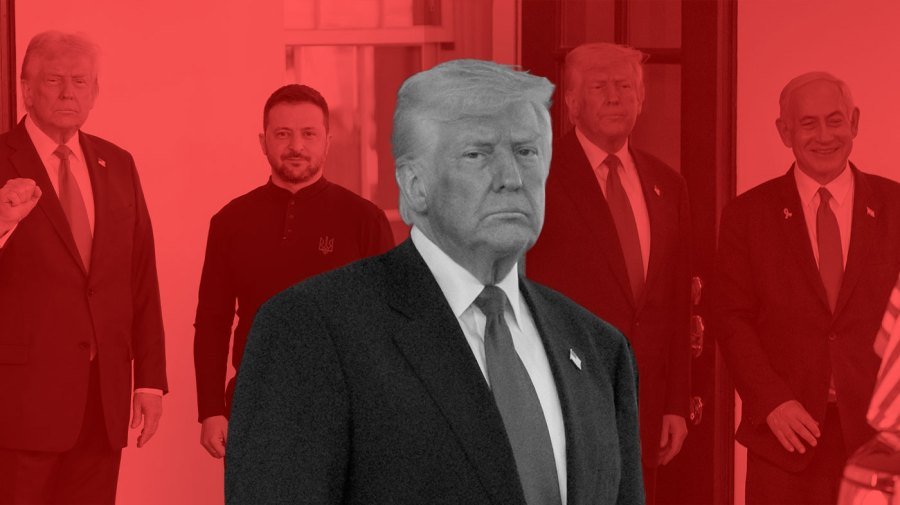
The limits of President Trump’s ability to control foreign events have been tested by an ally’s significant attack on an adversary, leaving him on the outside looking in for the second time in a month.
In Ukraine, President Volodymyr Zelensky in June opted not to inform Trump before launching a drone attack that destroyed 40 planes well within Russian territory, an operation that had been planned for more than a year.
It was a shocking attack in some ways, given the vulnerabilities it highlighted for Moscow. Trump responded with a call to Russia President Vladimir Putin, and later acknowledged the surprise Ukraine hit would make it more difficult to reach a peace deal, a top priority in the first six months of his administration.
Overnight Thursday, an even closer U.S. ally in Israel launched the biggest attack on Iran in more than 40 years, openly targeting nuclear sites, military bases and residential neighborhoods in Tehran.
The U.S. was not blindsided by Israel’s actions, but while the Trump administration was aware of the operation, it also distanced itself, making clear the military action was led solely by Israeli Prime Minister Benjamin Netanyahu.
“Tonight, Israel took unilateral action against Iran. We are not involved in strikes against Iran and our top priority is protecting American forces in the region,” Secretary of State Marco Rubio said in a Thursday statement released by the White House.
Trump insisted on the campaign trail that he would end ongoing wars in his first 24 hours as president, but that’s proved much harder to accomplish in practice.
Nearly six months into his second stint at the White House, neither crisis has an end in sight.
While that isn’t a terribly big surprise, it shows the limits of the president’s ability to make deals or impose his will to solve intractable conflicts.
It’s also given an opening to Democratic critics.
“We have a very weak strongman for president,” Wendy Sherman, the former deputy secretary of State under former President Biden, said Friday in a CNN interview.
She noted that since taking office, Trump has not resolved conflicts in Ukraine, Iran and Gaza and that there were still Israeli hostages being held in the Gaza Strip — all issues Biden also did not resolve before leaving office.
Sherman also said Friday that “Israel is in charge this morning, not Donald Trump.”
Trump seemed to be warning Israel off an attack in the hours before missiles were fired.
He said his administration was getting close to a nuclear deal with Iran and that any “imminent” attacks stood to “blow” any chance of an agreement. The president was adamant he supported a “more friendly path” between the adversaries.
“Look, I want to have an agreement with Iran. We’re fairly close to an agreement. We are fairly close to a pretty good agreement. It’s got to be better than pretty good, though,” he told reporters in the East Room. “As I think there is an agreement, I don’t want them [Israel] going in because I think I would blow it — might help it, actually, but it also could blow it. But we’ve had very good discussions with Iran.”
Israel launched its attack about eight hours later. By Friday morning, Iran had pulled out a sixth round of talks it had planned with the U.S. in Oman.
By then, Trump also was changing his tune.
“I gave Iran chance after chance to make a deal. I told them, in the strongest of words, to ‘just do it,’ but no matter how hard they tried, no matter how close they got, they just couldn’t get it done,” he wrote on Truth Social, pitting the blame on the Iranians who last week had openly criticized negotiations with the U.S. as “incoherent and disjointed.”
Presidents before Trump have been felled by the Middle East, and Trump has had some successes with Ukraine, most notably the signing of a mineral rights deal with Kyiv.
But the limits of dealmaking have also shown up on other issues.
The administration says it is conducting trade deal talks with more than 90 countries, but so far only a deal with the United Kingdom has come to fruition. Trump touted a deal with China earlier this week, but there is no indication he and Chinese President Xi Jinping have made that official.
Trump allies lauded the president’s approach to Iran, with Sen. Lindsey Graham (R-S.C.) saying Tehran should make a deal with Trump to give up its nuclear program.
“I hope and pray the ayatollah and his henchmen who are still alive will heed President Trump’s counsel,” Graham wrote on the social platform X. “If not, America – the greatest power for good on Earth – should be all-in to help Israel finish the job.”
And whatever limits Trump has encountered on dealmaking, he’s not done trying.
Even Iran, he said in comments after Israel’s deadly assault Friday, could get a “second chance.”
Trump told CNN’s Dana Bash that everyone he had been negotiating with had been killed. He later told NBC, when asked why the Iranians would want to negotiate a deal now, that some officials were calling him.
“They’re calling me to speak,” Trump said. When asked who was calling, Trump said, “The same people we worked with the last time. … Many of them are dead.”
Trump has long cast himself as anti-war, and has argued the Russian invasion of Ukraine and the Hamas attack on Israel would not have happened on his watch.
Much of the MAGA base has an isolationist bent, in part a backlash to the forever wars in Afghanistan and Iraq launched by former President George W. Bush, the only other Republican to serve in the White House this century.
On Friday, some of Trump’s remarks were pleas for peace.
“There has already been great death and destruction, but there is still time to make this slaughter, with the next already planned attacks being even more brutal, come to an end. Iran must make a deal, before there is nothing left,” Trump wrote on Truth Social.
An escalation of violence in the Middle East, even if the latest attack on Iran did not deploy the U.S.’s military might, stands to drag the U.S. into further conflict, if history is any indication.
“Trump has said he wants a deal and publicly warned Israel not to strike. Whether that was a strategic ruse or genuine restraint is now irrelevant. The Rubicon has been crossed,” Sina Toossi, a nonresident fellow at the Center for International Policy, wrote in an analysis.
“Rather than crippling Iran’s military and nuclear capabilities, Israel’s escalation risks fueling nationalist sentiment, solidifying internal cohesion, and triggering a dangerous cycle of retaliation, all while increasing the likelihood of American entanglement,” Toossi continued.
That would not play well with the likes of MAGA loyalists such as Charlie Kirk, who in a lengthy post on X firmly arguing against any further escalation, citing Iraq and Afghanistan.
“Dragging American into this war might be irrational and suicidal, but wars have a habit of making their participants irrational and suicidal (just look at the Ukraine war),” Kirk wrote.
“Our focus must not be on seeking regime change or any further escalation of America’s involvement. The last thing America needs right now is a new war. Our number one desire must be peace, as quickly as possible,” he continued.
Rema Rahman is the White House editor at The Hill.


